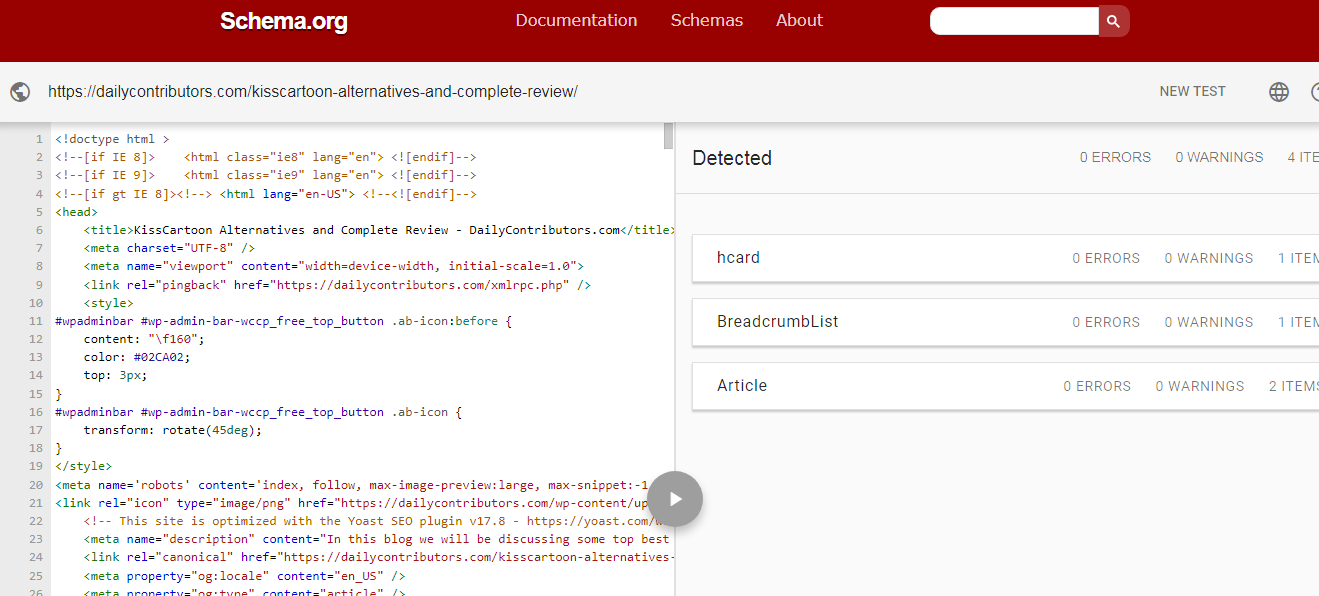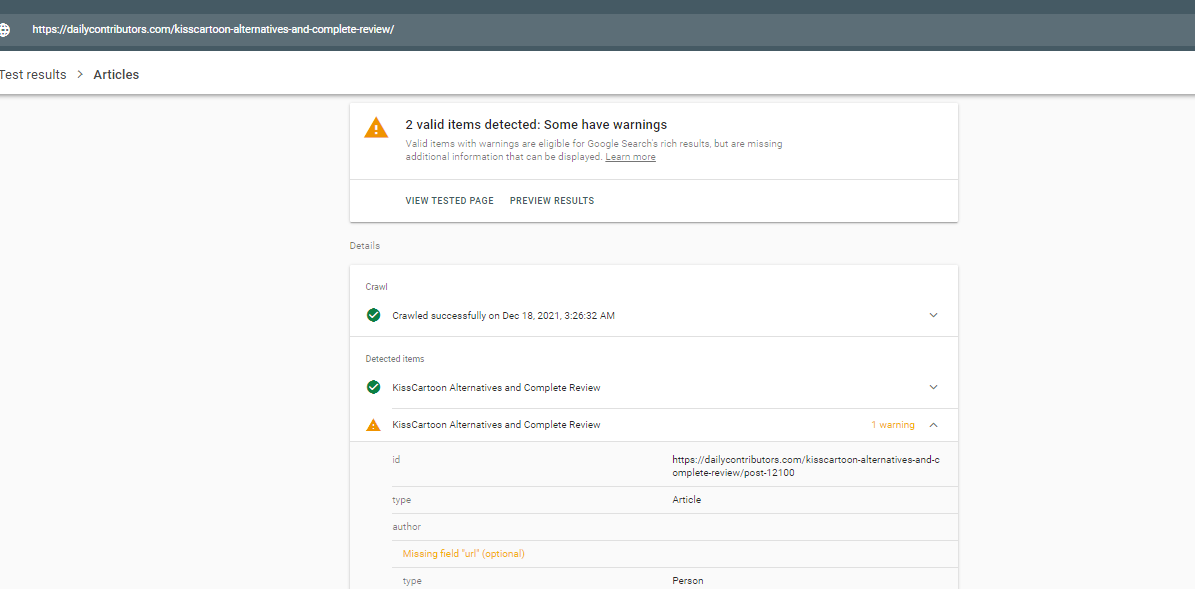Moz Q&A is closed.
After more than 13 years, and tens of thousands of questions, Moz Q&A closed on 12th December 2024. Whilst we’re not completely removing the content - many posts will still be possible to view - we have locked both new posts and new replies. More details here.
Schema Markup Warning "Missing field "url" (optional)"
-
Hello Moz Team, I hope everyone is doing well & good,
I need bit help regarding Schema Markup, I am facing issue in my schema markup specifically with my blog posts,
In my majority of the posts I find error "Missing field "url" (optional)"
As this schema is generated by Yoast plugin, I haven't applied any custom steps.Recently I published a post
https://dailycontributors.com/kisscartoon-alternatives-and-complete-review/
and I tested it at two platforms of schema test
1, Validator.Schema.org
2. Search.google.com/test/rich-resultsSo the validator generate results as follows and shows no error

It shows no error
But where as

in search central results it gives me a warning "Missing field "url" (optional)".
So is this really be going to issue for my ranking ? Please help thanks!
-
@JoeySolicitor I thinks , My website sam with your issue
Got a burning SEO question?
Subscribe to Moz Pro to gain full access to Q&A, answer questions, and ask your own.
Browse Questions
Explore more categories
-
Moz Tools
Chat with the community about the Moz tools.
-
SEO Tactics
Discuss the SEO process with fellow marketers
-
Community
Discuss industry events, jobs, and news!
-
Digital Marketing
Chat about tactics outside of SEO
-
Research & Trends
Dive into research and trends in the search industry.
-
Support
Connect on product support and feature requests.
Related Questions
-
What Schema would a Web design/development/seo ageny use and what is the schema.org link?
What Schema would a Web design/development/SEO Ageny use, and what is the schema.org link? I cannot for the life of me figure it out. ProfessionalService has been deprecated.
On-Page Optimization | | TiagoPedreira0 -
Unsolved Duplicate LocalBusiness Schema Markup
Hello! I've been having a hard time finding an answer to this specific question so I figured I'd drop it here. I always add custom LocalBusiness markup to clients' homepages, but sometimes the client's website provider will include their own automated LocalBusiness markup. The codes I create often include more information. Assuming the website provider is unwilling to remove their markup, is it a bad idea to include my code as well? It seems like it could potentially be read as spammy by Google. Do the pros of having more detailed markup outweigh that potential negative impact?
Local Website Optimization | | GoogleAlgoServant0 -
Looking for live web examples of Medical schema
Has anyone seen a hospital system or medical clinic properly employ schema markup to their sites? This seems like very new territory, and we want to do it right by our client. Are there any best practices I need to look out for?
Web Design | | Madgenius3 -
Sudden Indexation of "Index of /wp-content/uploads/"
Hi all, I have suddenly noticed a massive jump in indexed pages. After performing a "site:" search, it was revealed that the sudden jump was due to the indexation of many pages beginning with the serp title "Index of /wp-content/uploads/" for many uploaded pieces of content & plugins. This has appeared approximately one month after switching to https. I have also noticed a decline in Bing rankings. Does anyone know what is causing/how to fix this? To be clear, these pages are **not **normal /wp-content/uploads/ but rather "index of" pages, being included in Google. Thank you.
Technical SEO | | Tom3_150 -
Adding Reviews to JSON Product Schema Markup
Hi everyone, Below is an example of some JSON product schema markup I'd like to integrate into my site. My question is, what do I need to do to incorporate the individual reviews on a product page as well? I've tried a few different things but I can't get it to validate.
Technical SEO | | VDigitalServices0 -
How do I add "noindex" or "nofollow" to a link in Wordpress
It's been a while since I've SEOed a Wordpress site. How do I add "nofollow" or "noindex" to specific links? I highlight the anchor text in the text editor, I click the "link" button. I could have sworn that there used to be an option in the dialogue box that pops up.
Technical SEO | | CsmBill0 -
Why crawl error "title missing or empty" when there is already "title and meta desciption" in place?
I've been getting 73 "title missing or empty" warnings from SEOMOZ crawl diagnostic. This is weird as I've installed yoast wordpress seo plugin and all posts do have title and meta description. But why the results here.. can anyone explain what's happening? Thanks!! Here are some of the links that are listed with "title missing, empty". Almost all our blog posts were listed there. http://www.gan4hire.com/blog/2011/are-you-here-for-good/ http://www.gan4hire.com/blog/2011/are-you-socially-awkward/
Technical SEO | | JasonDGreat MaeM3.png TLcD8.png
0
MaeM3.png TLcD8.png
0 -
Hyphenated Domain Names - "Spammy" or Not?
Some say hyphenated domain names are "spammy". I have also noticed that Moz's On Page Keyword Tool does NOT recognize keywords in a non-hyphenated domain name. So one would assume neither do the bots. I noticed obviously misleading words like car in carnival or spa in space or spatula, etc embedded in domain names and pondered the effect. I took it a step further with non-hyphenated domain names. I experimented by selecting totally random three or four letter blocks - Example: randomfactgenerator.net - rand omf act gene rator Each one of those clips returns copious results AND the On-Page Report Card does not credit the domain name as containing "random facts" as keywords**,** whereas www.business-sales-sarasota.com does get credit for "business sales sarasota" in the URL. This seems an obvious situation - unhyphenated domains can scramble the keywords and confuse the bots, as they search all possible combinations. YES - I know the content should carry it but - I do not believe domain names are irrelevant, as many say. I don't believe that hyphenated domain names are not more efficient than non hyphenated ones - as long as you don't overdo it. I have also seen where a weak site in an easy market will quickly top the list because the hyphenated domain name matches the search term - I have done it (in my pre Seo Moz days) with ft-myers-auto-air.com. I built the site in a couple of days and in a couple weeks it was on page one. Any thoughts on this?
Technical SEO | | dcmike0